|
|
|
Sort Order |
|
|
|
Items / Page
|
|
|
|
|
|
|
| Srl | Item |
| 1 |
ID:
119259
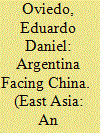

|
|
|
|
|
| Publication |
2013.
|
| Summary/Abstract |
The article explains the Argentine-Chinese economic relations and identifies the interest's network with the ongoing modernization processes in both countries. It can be observed that harmony is more important than discord when Argentina accepts the new China's international division of labor, but when Argentina tends to consolidate the process of economic de-primarization, tensions between both countries tend to emerge. The crisis about crude soybean oil in 2010 is the clearest example to illustrate that trade tensions between both countries will be most frequent if Argentine industrialization continues and the process of policy coordination fails.
|
|
|
|
|
|
|
|
|
|
|
|
|
|
|
|
| 2 |
ID:
151657
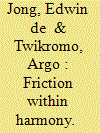

|
|
|
|
|
| Summary/Abstract |
Most studies on diversity in Southeast Asia focus on the nation-state, with much less attention given to everyday encounters and the negotiation of diversity in local contexts. This article investigates the discourses and practices of various actors in the historically tolerant, generally peaceful, and diverse city and special region of Yogyakarta, Indonesia. This study examines this ethnic, religious and cultural diversity and illustrates the negotiations among various interest groups and actors that strive to maintain this balance, or sometimes to strategically disrupt it. As such, the findings offer a different way to understand and interrogate the challenges confronting present-day diversity both on a local level in Yogyakarta, and also for Indonesia and Southeast Asia at large.
|
|
|
|
|
|
|
|
|
|
|
|
|
|
|
|
| 3 |
ID:
086776
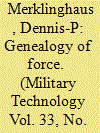

|
|
|
|
|
| Publication |
2009.
|
| Summary/Abstract |
In the beginning, harmony: tribes of human beings live as one, gathering and eating and playing and sleeping and singing and making love and telling stories together. And, occasionally,discord:an argument breaks out,strong words are exchange, a blow is struck.
|
|
|
|
|
|
|
|
|
|
|
|
|
|
|
|
| 4 |
ID:
095344
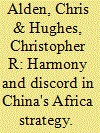

|
|
|
|
|
| Publication |
2010.
|
| Summary/Abstract |
This article examines the challenges faced by Beijing in managing this increasingly complex relationship, reflecting upon the structural factors that encourage harmony and introduce discord in China-Africa ties. It examines how various policy solutions being considered by China, ranging from increasing participants in the policy-making process to tentative engagement with international development regimes, may still not address the most difficult issues involving adverse reactions to the Chinese presence from African civil societies and political opposition groups. In particular the lack of a strong civil society inside China inhibits the ability of its policy makers to draw on the expertise of the kind of independent pressure groups and NGOs that are available to traditional donor/investor states. The article concludes by asking how the Chinese system can make up for these weaknesses without moving further towards the existing models and practices of the developed countries.
|
|
|
|
|
|
|
|
|
|
|
|
|
|
|
|
| 5 |
ID:
086908
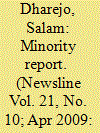

|
|
|
|
|
| Publication |
2009.
|
| Summary/Abstract |
Umerkot, the birthplace of Emperor Akbar and a city with a large Hindu population, celebrates Holi and Diwali with gusto every year. And Muslims have, in a show of harmony, always joined in the celebrations by singing and dancing alongside their Hindu neighbours and exchanging sweetmeats. But this year, on March 11, the celebrations took a tragic turn when an angry mob of Muslims attacked Hindus and destroyed their property to avenge what they claim was a "blasphemous act" committed by Hindus.
|
|
|
|
|
|
|
|
|
|
|
|
|
|
|
|
| 6 |
ID:
124995
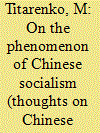

|
|
|
|
|
| Publication |
2013.
|
| Summary/Abstract |
Thoughts on the essence, features, and future of Chinese socialism are analyzed. The ongoing development and enrichment of the concept of socialism with a Chinese face as it applies to certain cultural and civilizational features of China and its socioeconomic and political structure are considered. The content of the scientific concept of development and its practical application are discussed. The great importance of the theory and practice of building socialism in China for the future of national rebirth and realizing humanity's dream of a fair and just society with universal prosperity is demonstrated.
|
|
|
|
|
|
|
|
|
|
|
|
|
|
|
|
| 7 |
ID:
060154
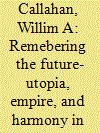

|
|
|
| 8 |
ID:
078282
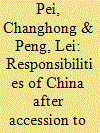

|
|
|
|
|
| Publication |
2007.
|
| Summary/Abstract |
China became a full member of the WTO on 11 December 2001. China has not only increased its presence in mainstream world trade but has gained knowledge about the basic rules of market economies and become more adaptable to changes in the international economy. As a new member of the WTO, being adaptable to changes in the international economy is essential. As a large developing country, China, with its rapid economic growth, huge volume of trade and substantial market potential, has exerted and will continue to exert profound influence on the world economy. It is commonly recognized that China's influence cannot be ignored in the world economy. Five years since its accession to the WTO, China is considering where it stands as a member of the WTO. What does China hope to achieve by being a member of the WTO, how can these hopes be shared among all trading partners, what is China's responsibility in this, and what are the responsibilities of other trading partners?
|
|
|
|
|
|
|
|
|
|
|
|
|
|
|
|
| 9 |
ID:
120566
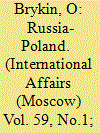

|
|
|
|
|
| Publication |
2013.
|
| Summary/Abstract |
RECENTLY, I visited Warsaw's only Orthodox cemetery, which is in Wola district. Founded more than 170 years ago, it is protected by law. An intriguing point of interest is the good coexistence here of two religious communities, Orthodox and Catholic, and that's a real fact. As mentioned in the cemetery guide, the two parishes "have irrespective of ecumenical tendencies become brotherly and collaborative in a spirit of service to God and the human family." In this connection there arises a possibly naïve but quite natural question: Why then for centuries have Russians and Poles been unable in this worldly, earthly life to learn to live in peace and harmony? That is, without interminable grudges and accusations, strife and discord.
|
|
|
|
|
|
|
|
|
|
|
|
|
|
|
|
| 10 |
ID:
113704
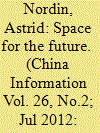

|
|
|
|
|
| Publication |
2012.
|
| Summary/Abstract |
China's modernization and rise is commonly understood as a key factor that will shape future world order. This article examines narratives at Expo 2010 Shanghai China as an instance of the local constitution of this future world. Such imaginations of China and/in the world actively create the future, through assumptions about time and space that structure the possible imaginations of China, the World, and their interrelation. This article examines how the technological and conceptual innovations that play out at the Expo draw on two common cosmologies, the 'unit-based' cosmology of the international state system and a Chinese 'holistic' imaginary of tianxia (all-under-heaven). It shows how these two cosmologies order universal/particular, time/space, and self/other through Beijing's 'harmonious world' policy. It argues that the two cosmologies are not mutually exclusive, but are deployed at the Expo in ways that reinforce one another by ordering spatial difference through teleological time. The effect is a story of China and the World where others are not different; they are just behind. This is a problem because the reduction of spatial difference to place in a historical queue makes it difficult to imagine plural futures, as opposed to The Future already inscribed in the story.
|
|
|
|
|
|
|
|
|
|
|
|
|
|
|
|
| 11 |
ID:
151268
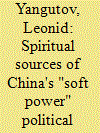

|
|
|
|
|
| Summary/Abstract |
The author analyzes the philosophical sources of the "soft power" strategy formation as one of the major components of the modern China political orientation. The PRC demonstrates notable achievements in the economic, political, social, and cultural spheres. The article also examines Daoism, Confucianism, and Buddhism, which exerted great influence on the formation of the "soft power" concept principles in China, and shows the use of these teachings for political influence on neighboring countries.
|
|
|
|
|
|
|
|
|
|
|
|
|
|
|
|
| 12 |
ID:
126037
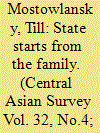

|
|
|
|
|
| Publication |
2013.
|
| Summary/Abstract |
Based on anthropological fieldwork between 2008 and 2011, this article focuses on how people in Tajikistan's eastern Pamirs conceptualize well-being through the establishment of peace and harmony. An exploration of the interactional use of the terms 'peace' and 'harmony' in Kyrgyz and Tajik (tynchtyk, yntymak, tinji, and vahdat) makes manifest that the meanings of these terms are connected to the fields of 'family', 'leadership', and 'state'. Basing their reasoning on the officially promoted analogy between family and state, people in the eastern Pamirs distinguish between social spaces that are related to well-being and those that are not. As a factor of distinction, and crucial to the establishment of peace and harmony, the moral quality of leadership plays an important role. Positive experiences of such leadership as balanced and morally pure are mainly identified and witnessed within families and neighbourhoods and only occasionally in state institutions. This discrepancy raises the question of where to locate boundaries between good and bad, moral and immoral, harmonious and conflictual. Thus, this article contributes not only to the study of local concepts of well-being in Central Asia but also to the study of local concepts of 'ill-being' which challenge them.
|
|
|
|
|
|
|
|
|
|
|
|
|
|
|
|
| 13 |
ID:
129805
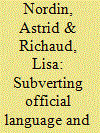

|
|
|
|
|
| Publication |
2014.
|
| Summary/Abstract |
While the promotion of 'harmony' (??) in Chinese official discourse is widely regarded as a feature of state propaganda and censorship, scarce attention has been paid to the reception and redeployment of such language among Chinese citizens. The often creative and ironic reappropriation of official language in everyday speech practices, both on the Internet and in conversations with peers, is an important aspect of Chinese language/politics and deserves careful examination. Much of the current work has regarded these discursive practices in terms of a resistance to 'harmonization' or, following a Bakhtinian reading, as 'carnival'. We argue that such approaches do not fully take into consideration actors' actual experience of consuming and producing such language play. Based on semi-structured interviews with Chinese university students conducted in 2009-11, this article shifts away from the dominant assumptions about the role of ironic reiterations of official language, in order to highlight how the presumed repoliticization of these linguistic practices also involves a depoliticization, reflecting the complexity and ambiguity of the relationships they negotiate.
|
|
|
|
|
|
|
|
|
|
|
|
|
|
|
|
| 14 |
ID:
053850
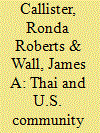

|
|
|
| 15 |
ID:
100352


|
|
|
|
|
| Publication |
2010.
|
| Summary/Abstract |
Pragmatism has been a leading feature of Communist Party policies since Mao Zedong's death. The attitude to religion has been something of an exception with many restrictions to the freedom of religion stipulated in the constitution. In recent years, while stressing the 'harmonious society', there has been a change in the view of religion. Recognizing the 'spiritual vacuum' in China after Mao, the party has seen the need for a controlled spiritual development that could also support the economic development. However, in this process the party has tried to control not only religious activity but also religious content and to use it for its own purposes. This is in direct opposition to Marx and Lenin's views on 'religion as opium' and indicates that the party is de facto using 'a reversed opium theory'.
|
|
|
|
|
|
|
|
|
|
|
|
|
|
|
|
| 16 |
ID:
104484
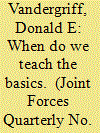

|
|
|
|
|
|
|
|